
About this Release
“Armenia is famous for its ancient history and cultural traditions that permeate the country's wealth of music. With its depth of expression, lyricism and authentic reflection of national traits, Armenian music retains a special place in the world's artistic heritage. My 'Secrets of Armenia' international music project is the country's leading authority on Armenian classical music. It leads the way in a pioneering development and appreciation of forgotten, yet uniquely significant pieces of Armenia's classical tradition. Art should not remain in oblivion.” — Mikael Ayrapetyan
BARKHUDARIAN, SARKIS (1887–1972)
Four Oriental Dances • 12 Armenian Dances • Piano Pieces, Series 1 and 2
- Mikael Ayrapetyan, piano
The Armenian and Georgian composer Sarkis Vasil’evich Barkhudarian is famed for his piano miniatures. Some are among the first piano works to use Armenian folk themes as the basis for a series of original compositions. His colourful and unusual harmonies, created by the sinuous, interweaving modes of Armenian music, are immediately attractive and his miniatures, whether full of grace or pungent dance rhythms, bear out Glazunov’s admiration of his ‘sincerity, elegance and harmony of form’.
Tracklist
|
Vostochniye plyaski (Oriental Dances) (1913) (00:10:00 )
|
|
1
Oriental Dance No. 1 * (00:02:59)
|
|
2
Oriental Dance No. 2 * (00:01:47)
|
|
3
Oriental Dance No. 3 * (00:02:50)
|
|
4
Oriental Dance No. 4 * (00:01:48)
|
|
12 Armenian Dances () (00:23:00 )
|
|
5
No. 1. Dance of the Bride * (00:01:45)
|
|
6
No. 2. Children's Dance * (00:01:05)
|
|
7
No. 3. Dance of the Matchmaker * (00:01:48)
|
|
8
No. 4. Dance of the Rural Girls * (00:01:43)
|
|
9
No. 5. Provocative Dance (Men's) * (00:01:33)
|
|
10
No. 6. Maiden's Roundelay * (00:01:20)
|
|
11
No. 7. Dance of Friendship (Men's) * (00:02:21)
|
|
12
No. 8. Dance of a Mountain Girl * (00:02:05)
|
|
13
No. 9. Dance of Farewell (Women's) * (00:02:14)
|
|
14
No. 10. Masker's Dance (Men's) * (00:02:17)
|
|
15
No. 11. Circular Dance (Joint) * (00:02:27)
|
|
16
No. 12. Festive Dance (Men's) * (00:01:43)
|
|
Piano Pieces, Series 1 (1918) (00:19:00 )
|
|
17
No. 1. Naz-Par * (00:02:29)
|
|
18
No. 2. Fairy Tale * (00:03:18)
|
|
19
No. 3. Sketch in B Minor * (00:01:43)
|
|
20
No. 4. Watercolor * (00:01:05)
|
|
21
No. 5. Smooth Dance * (00:01:33)
|
|
22
No. 6. Lullaby * (00:01:57)
|
|
23
No. 7. Maiden Dance * (00:01:45)
|
|
24
No. 8. Boots-Dragonfly * (00:00:41)
|
|
25
No. 9. Dance in A-Flat Major * (00:01:32)
|
|
26
No. 10. Sketch in D Minor * (00:02:30)
|
|
Piano Pieces, Series 2 (1923) (00:22:00 )
|
|
27
No. 1. Scherzo * (00:03:01)
|
|
28
No. 2. Circular Dance in B Minor * (00:02:51)
|
|
29
No. 3. Gulnara's Dance * (00:01:06)
|
|
30
No. 4. Nanochka's Dance * (00:01:16)
|
|
31
No. 5. Anoush's Sorrow * (00:02:13)
|
|
32
No. 6. Prelude in D Minor * (00:00:54)
|
|
33
No. 7. Prelude in D-Sharp Minor * (00:01:01)
|
|
34
No. 8. Nocturne * (00:04:08)
|
|
35
No. 9. Sketch in A Major * (00:02:43)
|
|
36
No. 10. Lullaby of Shushani * (00:02:41)
|
The Artist(s)
 Mikael Ayrapetyan is a pianist, composer, producer and teacher, as well as a researcher and public figure. He has done much to popularise Armenian classical music all over the world with his Secrets of Armenia musical project, which began during his studies at the Moscow Conservatory. Born in 1984 in Yerevan, Armenia, he studied at the Moscow Tchaikovsky State Conservatory, and continues to uphold the performing traditions of the Russian piano school, of which Konstantin Igumnov, Samuel Feinberg and Lev Oborin are luminaries. His repertoire ranges from the Baroque to the contemporary and includes rarely performed works by Armenian composers. This period was the start of his extensive concert activity in which he performs works by Tigranian, Chukhadjian, Komitas, Melikian, Spendiarian, Barkhudarian, Stepanian, Khachaturian, Babajanian, Arutyunian, Abrahamian, Bagdasarian, Avetisian, Mirzoyan, Amirkhanian and many other Armenian composers, which eventually led him to produce his own concerts. He was awarded the State Prize of the Republic of Armenia for his outstanding contribution to the development and popularisation of Armenian classical music.
Mikael Ayrapetyan is a pianist, composer, producer and teacher, as well as a researcher and public figure. He has done much to popularise Armenian classical music all over the world with his Secrets of Armenia musical project, which began during his studies at the Moscow Conservatory. Born in 1984 in Yerevan, Armenia, he studied at the Moscow Tchaikovsky State Conservatory, and continues to uphold the performing traditions of the Russian piano school, of which Konstantin Igumnov, Samuel Feinberg and Lev Oborin are luminaries. His repertoire ranges from the Baroque to the contemporary and includes rarely performed works by Armenian composers. This period was the start of his extensive concert activity in which he performs works by Tigranian, Chukhadjian, Komitas, Melikian, Spendiarian, Barkhudarian, Stepanian, Khachaturian, Babajanian, Arutyunian, Abrahamian, Bagdasarian, Avetisian, Mirzoyan, Amirkhanian and many other Armenian composers, which eventually led him to produce his own concerts. He was awarded the State Prize of the Republic of Armenia for his outstanding contribution to the development and popularisation of Armenian classical music. The Composer(s)
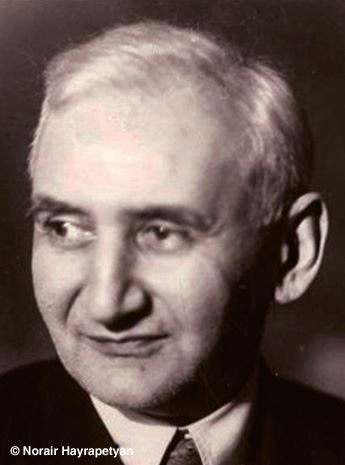 Barkhudarian was born on 7 September 1887 in Tiflis (now Tbilisi, the capital of Georgia), the third of eight siblings. His first musical experiences were those found directly around him: the visiting street musicians, and the Armenian folk songs that his mother, Varduhi Ivanovna Saipian, would sing for him. His earliest surviving compositions date from his time at the Music Institute: the first being a Waltz composed on 25 April 1903. He kept an album of his new piano compositions, all miniatures in a variety of forms, some with pictorial titles: Lullaby, Farewell Song, Brook, waltzes, and so on. This collection of around 40 miniatures from c. 1903–09 is equally influenced by the musical and the literary.
Barkhudarian was born on 7 September 1887 in Tiflis (now Tbilisi, the capital of Georgia), the third of eight siblings. His first musical experiences were those found directly around him: the visiting street musicians, and the Armenian folk songs that his mother, Varduhi Ivanovna Saipian, would sing for him. His earliest surviving compositions date from his time at the Music Institute: the first being a Waltz composed on 25 April 1903. He kept an album of his new piano compositions, all miniatures in a variety of forms, some with pictorial titles: Lullaby, Farewell Song, Brook, waltzes, and so on. This collection of around 40 miniatures from c. 1903–09 is equally influenced by the musical and the literary. Reviews
“More power to percipient pianist Mikael Ayrapetyan in ceaselessly developing the already wide compass of his Secrets of Armenia music project. We should also be thankful to Grand Piano for supporting Ayrapetyan’s quest. It can only be to the good that we get the opportunity to hear so much unknown music.” – MusicWeb International

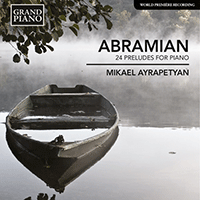
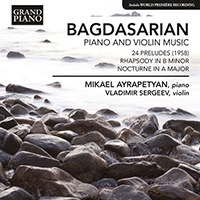
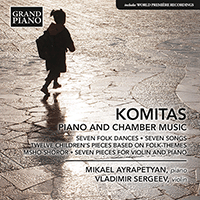
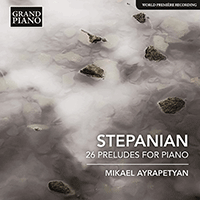
 Grand Piano has gained a reputation for producing high quality recordings of rare keyboard gems. Dedicated to the exploration of undiscovered piano repertoire, the label specialises in complete cycles of piano works by many lesser-known composers, whose output might otherwise have remained unknown and unrecorded.
Grand Piano has gained a reputation for producing high quality recordings of rare keyboard gems. Dedicated to the exploration of undiscovered piano repertoire, the label specialises in complete cycles of piano works by many lesser-known composers, whose output might otherwise have remained unknown and unrecorded.






